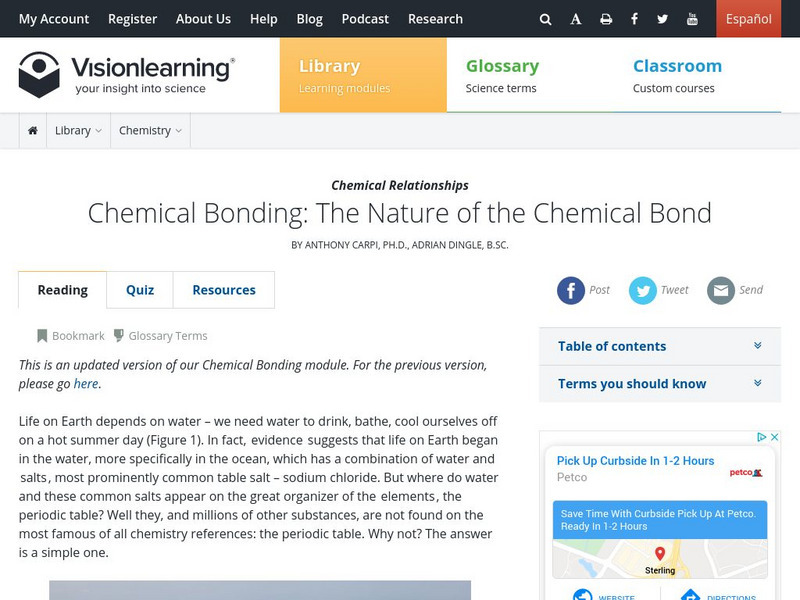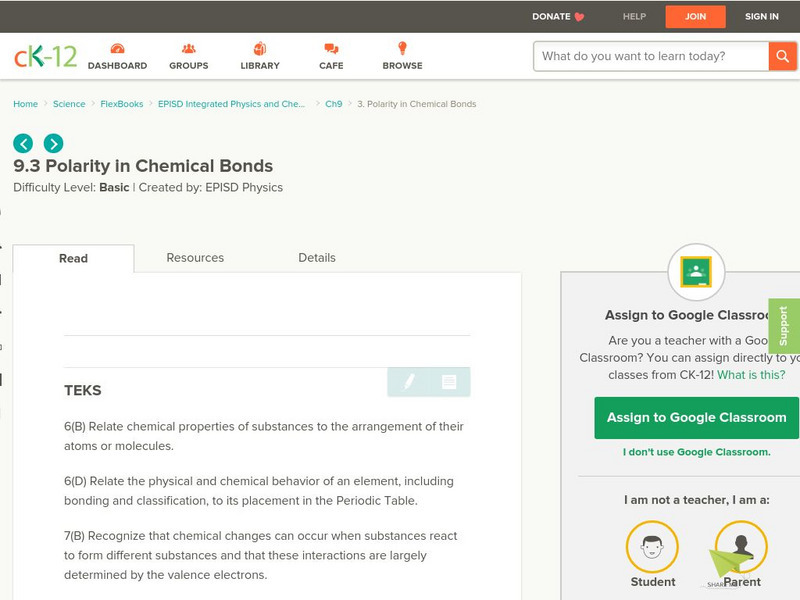Hi, what do you want to do?
Curated OER
Giants of the Protozoa
Students describe and define xenophyophores. In this protozoa lesson students divide into groups and complete a lab activity.
Curated OER
Science with Mud!
Eighth graders give some examples of chemical reactions they see everyday. In this chemistry lesson, 8th graders investigate how much water soil can hold. They collect data and compare results with others.
Curated OER
Nutrient Biochemistry
In this lipids worksheet, students review the different types of lipids and how lipids are used by the body. This worksheet has 3 drawings and 27 fill in the blank statements.
Curated OER
Empirical Formulas
In this empirical formulas activity, students read about determining empirical formulas from chemical formulas. They determine the empirical formula given ten molecular formulas. They also find the molecular formulas given the mass and...
Curated OER
Mixed Review
In this chemistry worksheet, students solve chemical equations and define terminology using previous knowledge. There are 8 review questions.
Curated OER
DNA Questions
In this forensic science worksheet, students analyze the characteristics and uses of DNA to complete 26 short answer questions.
Curated OER
Enzymes in Action
Students explore how enzymes are important in the chemical reactions of all living things. In this enzymes and catalysts lesson students complete an activity to see how enzymes change living things.
Curated OER
Chemistry
In this chemistry worksheet, students describe an atom, its parts, the charges of these parts, and atoms life functions. Then they explain what the octet rule states for the placements of electrons around the nucleus of an atom. Students...
Virginia Department of Education
Soap, Slime, and Creative Chromatography
Do you think chromatography paper suffers from separation anxiety? Young chemists make soap, slime, silly putty, and experiment with chromatography in this lesson. The material includes clear instructions for each experiment along with...
Curated OER
WHAT MAKES A LIGHT BULB LIGHT?
Young scholars are able to use inquiry to answer the essential questions. They are able to predict and test configurations of a battery, bulb, and wire that make the complete circuit. Students craft a group and individual theory of a...
Curated OER
Naming: Putting it all Together
In this naming compounds worksheet, high schoolers are given a flow chart guiding them to name chemical compounds. They are given several different compounds to name including binary covalent and binary ionic compounds.
Curated OER
Limiting Reagent
Students work in small groups with a small set of 8 nuts and 5 bolts to assemble into combinations of 1 nut: 1 bolt, and 2 nuts: 1 bolt. They explore the outcome and discuss. Then a student mixes two clear, colorless solutions together...
Curated OER
Periodic Trends
Learners explore the rationale behind the arrangement of the elements on the Periodic Table. Using internet and traditional research, students compare and contrast the properties of elements on the periodic table to determine a...
Curated OER
Molecular Models
For this molecular formula worksheet students fill in a table describing elements and chemical formulas. They identify, elements by type and how they bond. The student analyze molecular formulas to identify the number of atoms and if the...
Curated OER
Solutions and Suspensions
Students explore matter by conducting an in class demonstration. In this liquid mixture lesson, students identify the difference between a solution in which a solid dissolves into liquid, and a suspension where the solid doesn't dissolve...
Curated OER
Exploring Atoms
In this chemistry worksheet, students complete 29 fill in the bank questions about atoms based on the movie Exploring Atoms from the website www.brainpop.com .
Curated OER
The Big Burp:A Bad Day in the Paleocene
Students describe the overall events that occurred during the Paleocene extinction event as well as the processes that are believed to result in global warming after group research. They infer how a global warming event could have...
Curated OER
Making Molecular Models
In these creative hands-on activities, students construct several different molecular models that represent substances that play an essential role in our nutritional needs. Using gum drops and toothpicks, students design the models....
Curated OER
Teaching The Scientific Method Using Adhesives
Middle schoolers use the six step scientific method to experiment with the differences in adhesives. Students test for tack, shear, and peel in these activities.
Curated OER
Science: What Happens to Create the Lode?
Students understand how mineral deposits are formed and why they are not evenly dispersed. They create and describe three different precipitates from four solutions simulating mineral ore deposit formation in sedimentary rock.
Vision Learning
Visionlearning: Chemistry: The Nature of the Chemical Bond
This site talks about ionic, polar covalent, and non-polar covalent bonding.
Simon Fraser University
Chem1 Virtual Textbook: Models of Chemical Bonding: Why Do Chemical Bonds Form?
This extensive overview on chemical bonding seeks initially to answer the question, why do chemical bonds form? Information is provided on classical models of chemical bonding and quantum mechanical models of the chemical bond.
PBS
Pbs Learning Media: Chemical Bonds
This interactive activity developed for Teachers' Domain demonstrates how attractive forces between atoms create chemical bonds, resulting in the formation of molecules and compounds.
CK-12 Foundation
Ck 12: Polarity in Chemical Bonds
[Free Registration/Login may be required to access all resource tools.] Students will determine the polarity of a chemical bond using the electronegativity chart, and then distinguish between nonpolar covalent, polar covalent, and ionic...




























